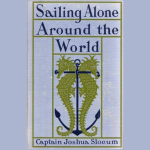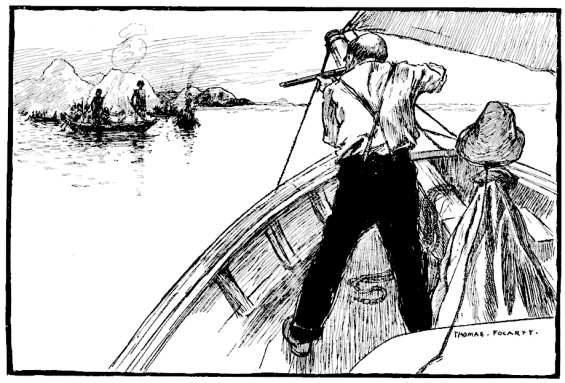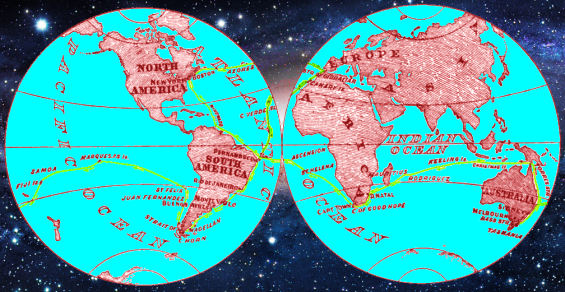
 Sailing Alone Around The World
Sailing Alone Around The World
By Joshua Slocum; Read by Alan Chant
1 |M4B|, 22 Zipped MP3 Files, or Podcast – Approx. 7 Hours 52 Minutes [UNABRIDGED]
Publisher: LibriVox.org
Published: May 9, 2007
|ETEXT|
Joshua Slocum was the first man to sail around the world alone in a small boat. He personally rebuilt an 11.2 metre sloop-rigged fishing boat that he named the Spray. On April 24, 1895, he set sail from Boston, Massachusetts. More than three years later, he returned to Newport, Rhode Island, on June 27, 1898 having circumnavigated the world, a distance of 46,000 miles (74,000 km). In 1899 he described the voyage in Sailing Alone Around the World now considered a classic of travel literature. It is a wonderful adventure story from the Age of Sail and a book of which Arthur Ransome declared, “boys who do not like this book ought to be drowned at once.”
Podcast feed: http://librivox.org/bookfeeds/sailing-alone-around-the-world-by-joshua-slocum.xml
iTunes 1-Click |SUBSCRIBE|
I was listening to an episode of the CBC Radio One Ideas podcast, entitled Sailing Alone Around The World |MP3|, and was struck by the story of the first man to do that very thing. The program uses excerpts from Slocum’s book of the same name, and interviews those modern solitary sailors who’ve followed in Slocum’s wake. The fact that, in some sections of the sea, the next nearest human being to a lone sailor might be someone on the International Space Station, was an astounding revelation to me. The fact that there have been fewer solitary circumnavigators than there have been people in space, also astounding. So, not even half-way through the show I set my sights on LibriVox, where I searched for, found, and downloaded an M4B of the audiobook.
Slocum was an Canadian by birth and a naturalized American. In the late 19th century, upon finding himself out of work (the age of coal powered ships had begun in earnest), Slocum found there was no more call for a tall ship captain. One day Slocum finds himself having been gifted with an aged sloop. And so he sets about refitting it, hires himself out to himself plans to write a book (serialized in the Century magazine), loads up his cabin with food, supplies and lots of books, and sets sail on a solitary circumnavigation of the planet earth.
What he finds in the adventure is, simply put, real adventure! Slocum is alone for the entire trip except for The Spray itself, Slocum’s sloop, which is full of emotions (it feels happy when the sailing is good, and becomes anxious when in port too long). Similarwise he has a few passengers, there’s a hungry goat, a sneaky bilge rat, and a long suffering spider (it meets another just like it half a planet away from where it was born).
In his more than three years at sea Slocum meets with ship thieves, admirals, colonial governors, the widow (and adopted son) of Robert Louis Stevenson, friendly natives, hostile natives, officious bureaucrats, friendly bureaucrats, storms, reefs, sickness, and even a ghost!
Along the way he salute’s the sea god Neptune, ports at many memorable anchorages, including the island of the real life inspiration for Daniel Defoe’s Robinson Crusoe (Alexander Selkirk), and becomes an international celebrity.
Slocum’s narrative is helped by his enjoyable sense of humor and hindered by his prejudices. And while the various characters that he meets in the book may sometimes benefit from Slocum’s breezy writing style I got no real sense of the other side of the story. Incidents with thieves, one man steals his pistol, and one South American boy tries to steal his ship, come across as far less frightening than they might really have been. Indeed, there’s something of a deliberate storyteller to this travel narrative, something which reminds me of Sławomir Rawicz’s extraordinary adventure memoir The Long Walk (it may have been entirely made up). That said, the documentation seems far more present, and the journey here does seem to have actually occurred.
Narrator Alan Chant has an English accent and a relaxed reading style. There’s a bit of background noise in the recording, but the audio is very serviceable. Each chapter begins and ends with a bit of seabird song. Recommended.


Posted by Jesse Willis